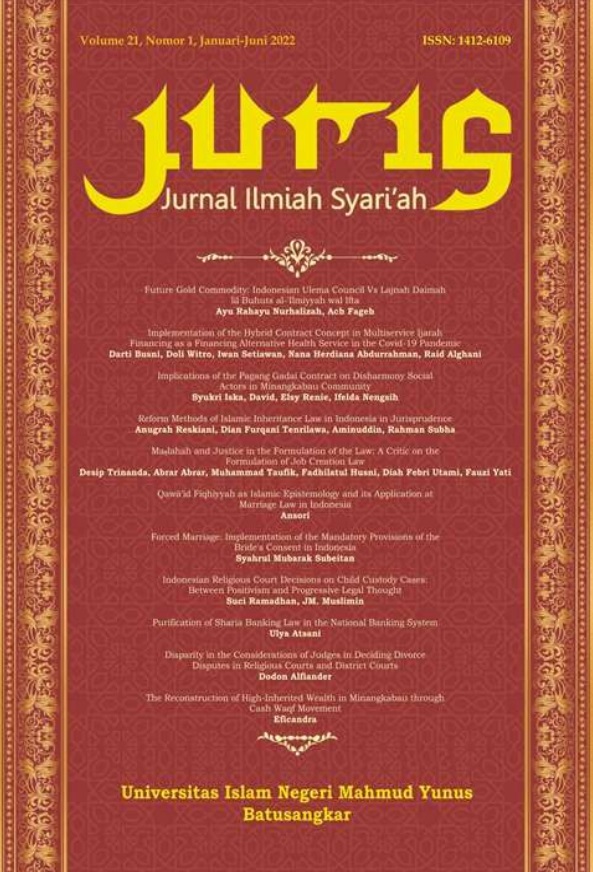Bridging Fiqh and Positive Law: A New Paradigm for Child Legality and the Best Interest of the Child in Indonesia
DOI:
https://doi.org/10.31958/juris.v23i2.10712Keywords:
Child Legality, Fiqh, Positive Law, The Best Interest of the Child, Maq?üß?úid al-shar?½ÔÇÿahAbstract
This study aimed at explaining the shift in the legality of children in Indonesia in the decisions of the Religious Court and SyarÔÇÖiyah Court regarding the determination of the origin of children. This normative legal research used a conceptual approach, legal regulations, and cases. The data were obtained from the decisions of the Religious Court and SyarÔÇÖiyah Court as well as legal regulations in Indonesia. The data were collected through literature review. The research results showed that the judgesÔÇÖ considerations no longer strictly adhered to fiqh, but referred to Indonesian positive law and even ignored both by prioritizing justice and the benefit of children. The judgesÔÇÖ decisions that had accommodated the welfare of children were in line with maq─üß╣úid al-shar─½ÔÇÿah, which requires the maintenance of the five basic foundations for children such as religion, soul, reason, heredity, and property. This research confirmed that there has been a shift in the legality of children in Indonesia in judgesÔÇÖ decisions from fiqh to positive law which prioritizes the best interests of children.
References
A. Hasanuddin. (2020, Maret 18). MARI MAKMURKAN MASJID UNTUK MENCEGAH BENCANA. Kementerian Agama Kota Tangerang. https://tangerangkota.kemenag.go.id/mari-makmurkan-masjid-untuk-mencegah-bencana/
Abdurrahman, A. (2020). Hadis-Hadis Tentang Media Dakwah.
Abu Abdullah Muhammad bin Yazid bin Abdullah bin Majah al-Quzwaini. (t.t.). Sunan Ibnu Majah. Al-Alamiyah.
Abu Isa Muhammad bin Isa bin Saurah at-Tirmidzi. (t.t.). Sunan Tarmidzi. Al-Alamiyah.
Aflaha, U. (2017). Kaos Hadis Sebagai Media Dakwah dan Komunikasi Alternatif. INJECT (Interdisciplinary Journal of Communication), 2(2), 247–274.
Ahmad bin Hanbal asy-Syaibani. (t.t.). Musnad Ahmad. Al-Alamiyah.
al-Bukhari, M. bin I. (t.t.). Shahih Al-Bukhari. Al-Alamiyah.
Althaf Husein Muzakky & , Fahruddin. (2020). Kontekstualisasi Hadis dalam Interaksi Media Sosial di Era Millenial dalam Kitab Fatḥ al-Bārī Syaraḥ Ḥadīs al-Bukhārī. Diroyah: Jurnal Studi Ilmu Hadis, 5, 12–20.
Bakhtiar, B. (2021). METODE IJTIHAD MUI DALAM PENYELENGGARAAN IBADAH P ADA SITUASI PANDEMI COVID-19. Jurnal AL-AHKAM, 12(1), 89–106.
Burhanudin, A. M., Nurhidayah, Y., & Chaerunisa, U. (2019). DAKWAH MELALUI MEDIA SOSIAL. ORASI: Jurnal Dakwah dan Komunikasi, 10(2), Art. 2. https://doi.org/10.24235/orasi.v10i2.5658
Cholid Nobuko dan Abu Achmadi. (2001). Metodologi Penelitian. Bumi Aksara, Jakarta.
developer, mediaindonesia com. (2020, Maret 20). Hadis Dhaif Kerap Dipakai jadi Seruan ke Masjid Saat Wabah Korona. https://mediaindonesia.com/humaniora/297983/hadis-dhaif-kerap-dipakai-jadi-seruan-ke-masjid-saat-wabah-korona
Fahmi, R. M. R., Aeres, I., Wibawa, I. M. C. T., & Dr. Reza Pahlevi Dalimunthe, M. A. (2021). A Silaturahmi Melalui Media Sosial Perspektif Hadits. AL-HIKMAH (Jurnal Pendidikan Dan Pendidikan Agama Islam), 3(2), Art. 2.
Galuh A. Savitri. (2017, Oktober 28). MENGAPA YOUTUBE POPULER? BINUS UNIVERSITY MALANG | Pilihan Universitas Terbaik di Malang. https://binus.ac.id/malang/2017/10/mengapa-youtube-populer/
iNews.id. (2021). Hadits Keutamaan Puasa Senin-Kamis | iNews.id. LINE TODAY. https://today.line.me/id/v2/article/q5XvaK
Jalil, A. (2021). Peranan Media Sosial dalam Peningkatan Motivasi Belajar Peserta Didik pada Mata Pelajaran Qur’an Hadis Kelas VIII MTS Madani Alauddin Paopao Kabupaten Gowa. [PhD Thesis]. Universitas Islam Negeri Alauddin Makassar.
KH.Nawawi. (2021). Pengantar Studi Hadis. Literasi Nusantara, Malang.
Kristina. (2021, Mei 8). Mengenal Puasa Pertengahan Bulan yang Dianjurkan Rasulullah. detiknews. https://news.detik.com/berita/d-5669080/mengenal-puasa-pertengahan-bulan-yang-dianjurkan-rasulullah
Maarif, S. D. (2021). Adab Bersosial Media dalam Pandangan Islam. tirto.id. https://tirto.id/adab-bersosial-media-dalam-pandangan-islam-gch5
Mahmud Ath-Thahhan. (2017). Musthalah al-Hadis (cetakan I). Ummul Qura.
Maisyaroh, A. S. (2020). Berakidah ala Al-Ghozali: Analisis Pelaksanaan Ibadah pada Masa Pandemi Covid-19 di Desa Bluru Kidul, Sidoarjo. ACADEMIA.
Miski, M. (2017). Fenomena Meme Hadis Celana Cingkrang Dalam Media Sosial. Harmoni, 16(2), 291–306.
Muhtador, M. (2018). Studi Kritis atas Transmisi dan Otoritas Keagamaan di Media Sosial. FIKRAH, 6(2), 323–340.
Nasir, M. K. M., Zaman, A. R. K., Azid, M. A. A., & Hussain, A. A. (2021). Trend kajian hadis berasaskan teknologi maklumat dan digital: Suatu sorotan literatur. HADIS, 11(22), 770–779.
Norazman, H., Kumar, K., & Basiron, B. (2019). Media Sosial dan Perpustakaan Menurut Islam.
Pangestu, P. P. (2021). Efektivitas Dakwah Hadis dalam Media Sosial: Analisis atas Teori Framing Robert N. Entman. Jurnal Dakwah dan Komunikasi, 6(1), 67–82.
Pranoto, S. S. (2018). Inspirasi Alquran dan Hadis dalam Menyikapi Informasi Hoax. AL QUDS: Jurnal Studi Alquran dan Hadis, 2(1), 29–50.
Rubawati, E. (2018). Media Baru: Tantangan dan Peluang Dakwah. Jurnal Studi Komunikasi, 2(1).
Sadly, E. (2018). Manajemen Dakwah Media Sosial: Telaah Terhadap Perkembangan Metode Dakwah Islam. JRMB (Jurnal Riset Manajemen dan Bisnis), 3(2).
Saifudin, S. (2018). Memahami Hadis Ukhuwwah dalam Konteks Media Sosial (Upaya Membangun Etika Solidaritas Sosial). Riwayah : Jurnal Studi Hadis, 3(1), 53. https://doi.org/10.21043/riwayah.v3i1.3464
Teungku Muhammad Hasbi ash-Shiddieqy. (2013). Sejarah & Pengantar Ilmu Hadits (cetakan kedelapan). PT Pustaka Rizki Putra.
Ulya. (2010). Metode Penelitian Tafsir. Nora Media Enterprise.
Zed, M. (2004). Metode peneletian kepustakaan. Yayasan Obor Indonesia.
Downloads
Published
How to Cite
Issue
Section
License
Copyright (c) 2024 Agustin Hanapi, Sarina Aini, Cut Endang Puspa Sari

This work is licensed under a Creative Commons Attribution-NonCommercial-NoDerivatives 4.0 International License.
Authors who publish with this journal agree to the following terms:- Authors retain copyright and grant the journal right of first publication with the work simultaneously licensed under a Creative Commons Attribution License that allows others to share the work with an acknowledgement of the work's authorship and initial publication in this journal.
- Authors are able to enter into separate, additional contractual arrangements for the non-exclusive distribution of the journal's published version of the work (e.g., post it to an institutional repository or publish it in a book), with an acknowledgement of its initial publication in this journal.
- Authors are permitted and encouraged to post their work online (e.g., in institutional repositories or on their website) prior to and during the submission process, as it can lead to productive exchanges, as well as earlier and greater citation of published work (See The Effect of Open Access).








